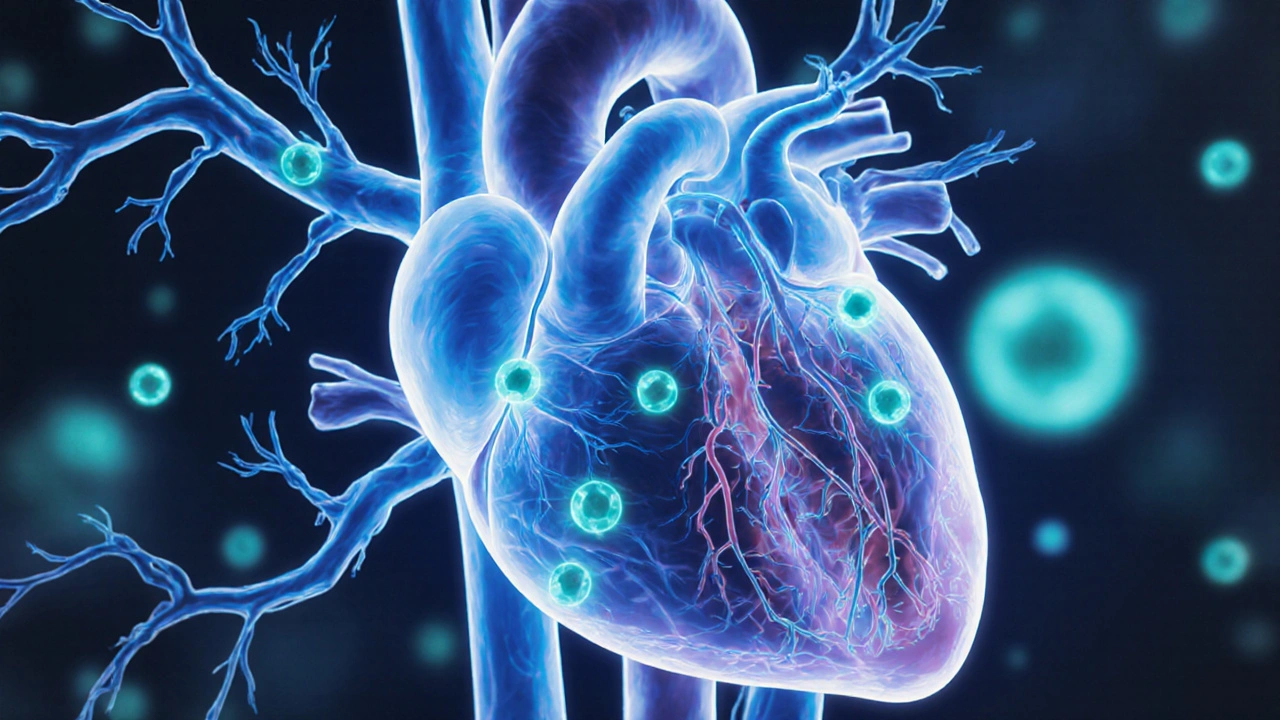Blood Pressure Reduction Estimator
Lifestyle Changes Implemented
Diltiazem HCL is a calcium channel blocker prescribed to lower blood pressure and relieve chest pain caused by angina. It relaxes the muscles in your blood‑vessel walls, making it easier for blood to flow and reducing the workload on your heart.
How Diltiazem HCL Works in the Body
When you take Diltiazem HCL, it blocks calcium channels in the smooth muscle of arteries and in the heart’s conduction system. By preventing calcium from entering these cells, the medication causes the vessels to widen (vasodilation) and slows the heart’s electrical signals. The result is lower systolic and diastolic blood pressure and a slower, more efficient heartbeat.
Conditions Most Often Treated
Hypertension chronically high blood pressure that raises the risk of heart attack, stroke, and kidney disease is the primary reason doctors prescribe Diltiazem HCL. The drug is also a go‑to for Angina chest pain due to reduced blood flow to the heart muscle, especially when other meds aren’t enough on their own.
Common Side Effects - What to Watch For
Most people tolerate Diltiazem HCL well, but a few side effects are frequent enough to mention:
- Swelling in the ankles or feet (peripheral edema)
- Headache or light‑headedness, especially when standing up quickly
- Flushes or a feeling of warmth
- Fatigue or mild dizziness
If you notice an irregular heartbeat, severe shortness of breath, or a sudden drop in blood pressure, call your doctor right away.
Drug Interactions and Food Considerations
Because Diltiazem HCL is processed by the liver enzyme CYP3A4, certain substances can raise its level in the blood and increase side‑effects. Notable interactions include:
- Other calcium channel blockers medicines that also affect calcium channels (e.g., verapamil)
- Beta‑blockers (e.g., atenolol) - may cause excessive slowing of heart rate
- Statins such as simvastatin - higher risk of muscle pain
- Grapefruit juice - can boost Diltiazem levels and lead to dizziness
Always tell your pharmacist about over‑the‑counter meds, herbal supplements, and your diet.

Why Lifestyle Changes Still Matter
Even though Diltiazem HCL does a lot of the heavy lifting, the best heart health plan mixes medication with everyday habits. Lifestyle tweaks can enhance the drug’s effect, lower the dose you need, and cut long‑term risks.
Diet Adjustments That Pair Well With Diltiazem
Two eating patterns consistently lower blood pressure:
- DASH diet Dietary Approaches to Stop Hypertension, rich in fruits, vegetables, whole grains, and low‑fat dairy. It reduces sodium intake to under 2,300 mg per day and emphasizes potassium‑rich foods like bananas and beans.
- Mediterranean diet focuses on olive oil, nuts, fish, and plant‑based foods while limiting red meat. The healthy fats support vessel flexibility and complement the vasodilating action of Diltiazem.
Practical tips:
- Season meals with herbs, lemon, or vinegar instead of salt.
- Swap processed snacks for a handful of unsalted almonds.
- Choose fresh or frozen vegetables over canned varieties that may contain added salt.
Exercise: Moving Toward a Stronger Heart
Regular aerobic activity improves the very pathways Diltiazem targets - the blood vessels. Aim for at least 150 minutes of moderate‑intensity aerobic exercise activities that raise heart rate and breathing for an extended period each week. Good options include brisk walking, cycling, swimming, or dancing.
Start slow if you’re new to exercise:
- Walk 10 minutes at a comfortable pace.
- Add 5 minutes each session until you reach 30 minutes.
- Split the time into two 15‑minute walks if that feels easier.
Strength training twice weekly also helps maintain muscle mass, which supports blood‑pressure control.
Weight Management, Smoking, and Alcohol
Excess weight pushes the heart to work harder, raising the need for medication. Losing even 5-10 % of body weight can drop systolic pressure by 5 mm Hg on average.
If you smoke, quitting is one of the fastest ways to improve vessel health. Nicotine narrows arteries, counteracting the dilation Diltiazem provides.
Alcohol should be limited to no more than two drinks per day for men and one for women. Too much alcohol can raise blood pressure and interact with the drug’s metabolism.

Monitoring and When to Call Your Doctor
Regular check‑ups let you see how well Diltiazem HCL and your new habits are working together. Typical monitoring includes:
- Blood‑pressure readings at home - aim for < 130/80 mm Hg unless your doctor advises otherwise.
- Heart‑rate checks - Diltiazem can slow the pulse; keep it between 60-80 bpm at rest.
- Blood tests every 6-12 months to watch liver function and electrolytes.
Call your healthcare provider if you experience:
- Persistent dizziness or fainting.
- Rapid weight gain (sign of fluid buildup).
- Chest pain that doesn’t improve with rest.
Quick‑Reference Checklist
- Take Diltiazem HCL exactly as prescribed - usually once or twice daily.
- Follow a low‑sodium DASH or Mediterranean eating plan.
- Do 150 minutes of aerobic activity each week.
- Maintain a healthy weight; aim for a BMI under 25.
- Avoid grapefruit juice and discuss any new supplements with your pharmacist.
- Track blood pressure at home and share trends with your doctor.
Comparison of Lifestyle Changes vs. Medication Effect
| Change | Typical Systolic Reduction | Typical Diastolic Reduction | How It Works with Diltiazem HCL |
|---|---|---|---|
| Reduce sodium to <2,300 mg/day | 5-8 | 3-5 | Lessens vascular resistance, letting the drug relax vessels more effectively |
| 150 min moderate aerobic exercise | 4-7 | 2-4 | Improves endothelial function, supporting vasodilation |
| Weight loss of 5 % body weight | 6-10 | 4-6 | Reduces cardiac output demand, allowing lower drug dose |
| Smoking cessation | 4-5 | 2-3 | Removes nicotine‑induced vasoconstriction, enhancing drug effect |
Frequently Asked Questions
Can I take Diltiazem HCL with over‑the‑counter pain relievers?
Acetaminophen is generally safe, but NSAIDs like ibuprofen can raise blood pressure and may blunt the drug’s effect. Talk to your doctor before combining them.
How long does it take to feel the benefit of Diltiazem HCL?
Most patients notice a reduction in blood‑pressure numbers within 1‑2 weeks, but full symptom relief for angina may take up to 4 weeks.
Is it okay to skip a dose if I feel fine?
Skipping doses can cause blood‑pressure spikes. If you miss a dose, take it as soon as you remember-unless it’s almost time for the next one. Then skip the missed dose and continue as scheduled.
Will the DASH diet interfere with my medication?
No, the DASH diet complements Diltiazem HCL. It lowers sodium and adds potassium, which both help the drug keep blood vessels relaxed.
What should I do if I develop swelling in my ankles?
Mild ankle edema is a common side effect. Elevate your legs, reduce salt, and wear compression stockings. If swelling worsens or is painful, contact your clinician for a possible dose adjustment.


11 Comments
October 21, 2025 Jake Hayes
Diltiazem HCL is a proven antihypertensive, but relying solely on medication is short‑sighted. Pair it with proven lifestyle modifications for optimal cardiovascular outcomes.
October 22, 2025 parbat parbatzapada
Yo, they don’t tell you the real side‑effects of grapefruit juice – it’s a hidden agenda by the pharma elite. Trust no one, especially the nutrition lobby.
October 23, 2025 Ericka Suarez
This med works fine for us Americn patriots, no need to adopt foreign fad dietz. Keep the dosage low and the flag flying.
October 24, 2025 Erika Thonn
One might contemplate the heart not merely as a pump, but as a symbol of the relentless rhythm of existence. It beats in concert with the tides of time, echoing the pulse of the universe itself. When Diltiazem intervenes, it does not merely dilate vessels; it subtly rewrites the dialogue between cellular calcium and the fleeting moments of mortality. Yet, the body is a tapestry of habits, each thread woven by the choices we make daily. The DASH diet, for instance, is more than a regimen; it is an ode to moderation, a culinary prayer against excess sodium that reminds us of balance. Likewise, the Mediterranean approach whispers of ancient seas, where olive oil glistened like sunrise on water, fostering vessel elasticity through monounsaturated grace. Exercise, then, becomes a ritual – a moving meditation that reinforces the very arteries that medicine seeks to support. Weight management is not a vanity project; it is an act of stewardship, honoring the vessel that carries our consciousness. Smoking, the insidious thief, erodes this stewardship, constricting the lifeline that should remain unimpeded. Alcohol, in modest measure, may soothe, but overindulgence storms the system like a tempest at sea. These lifestyle elements collectively converse with Diltiazem, each amplifying or dampening its effect, crafting a symphony of health or discord. Monitoring blood pressure at home is akin to listening to one's own internal compass, adjusting course before storms arrive. The interplay of medication and habit thus reflects a deeper truth: health is not prescribed, it is cultivated. In this cultivation, every bite, every step, every breath contributes to the narrative of a heart that beats beyond mere survival, aspiring toward vitality.
October 25, 2025 Rachel Valderrama
Great, another 12‑point checklist. If you actually follow it, your heart will thank you-unless you enjoy chronic fatigue. So lace up those sneakers and stop scrolling.
October 26, 2025 Brandy Eichberger
I appreciate the thoroughness of the guide; however, one could argue that the DASH diet is simply a refined iteration of timeless Mediterranean principles. Both emphasize fruits, vegetables, and healthy fats, making the distinction more academic than practical.
October 27, 2025 Eli Soler Caralt
When we speak of heart health, we tread upon the border between science and philosophy 🌱. Diltiazem offers a pharmacologic bridge, yet the true conduit is our daily ritual-what we eat, how we move, how we breathe. Think of each almond as a tiny philosopher questioning the sodium excess that threatens vascular elegance. The Mediterranean diet, with its olive‑oil rivers, flows like a quiet poem, soothing the arterial walls. Meanwhile, the DASH approach sounds like a marching order, commanding lower sodium but delivering the same serenity. Exercise, be it a brisk walk or a spirited dance, is the body’s own meditation, aligning pulse with purpose. In the grand tapestry, each habit threads a subtle hue that either brightens or dulls the medication’s impact. Remember: grapefruit juice is a rogue element, a mischievous sprite that can tip the balance, so treat it with caution. Ultimately, health is a collaborative masterpiece, composed of doctor’s counsel, patient’s commitment, and nature’s bounty 😊.
October 29, 2025 Eryn Wells
Thanks for sharing! 🌍 Incorporating diverse cuisines can make the DASH and Mediterranean diets feel less like a chore and more like a celebration of global flavors. Keep the community motivated!
October 30, 2025 Kathrynne Krause
Let’s turn those guidelines into a vibrant lifestyle adventure! 🎉 Swap out salty chips for crunchy carrot sticks, blast your favorite upbeat playlist, and watch your blood pressure drop like the beat drop in a sick remix. You’ve got this!
October 31, 2025 John Price
Just take the pills and walk.
November 1, 2025 Nick M
Look, the pharma cartels want you glued to the pill bottle while they sell you “natural” supplements that do nothing. Diltiazem works, but don’t be fooled by jargon‑laden hype-stick to evidence, not conspiracy.
Write a comment